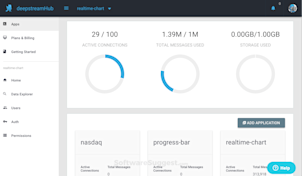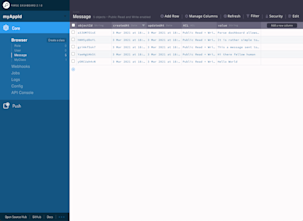deepstream.io vs Parse server
This deepstream.io vs Parse server comparison was created based on reviews from developers and our best attempts to perform analysis by looking at documentation and other publicly available resources.
Easily build complete, trusted realtime functionality.
Take our APIs for a spin deepstream.io |  Parse server | |
|---|---|---|
| Getting started and developer experience | ||
Time to "hello world" Reviewed by 3+ independent developers Ratings were given based on the average amount of time it takes to sign up to a new account and publish the first message. | 4 / 5 5 = <30 min | 5 / 5 5 = <30 min |
Demos / Tutorials A selection of online demos and tutorials so you can test and see the code in action. Explore Ably's tutorials for our pub/sub messaging platform | ||
Documentation Reviewed by 3+ independent developers Explore Ably's documentation for our pub/sub messaging platform | 4 / 5 Getting started guides / 5 Information architecture and developer journey / 5 API reference documentation / 5 Readability, design and navigation / 5 Quality of code / 5 Breadth and quality of tutorials / 5 The deepstream.io documentation is nicely written and features several components: GitHub, guides, tutorials, docs, blog, and miscellaneous info, such as FAQs. There’s a Getting Started guide using HTTP API, JavaScript Client API, and Java Client API, with code snippets throughout. The API reference is detailed for each SDK and information architecture is pretty nice. Most sections of the documentation are well cross-linked; however, the navigation experience could be improved, especially around the API reference – some links return 404. Also, some documentation pages need to be revamped. The documentation provides tutorials for most deepstream.io features but unfortunately, there’s no demos. The documentation for the core features (data-sync, records, auth, permissions, events, rpc, etc.) is well written, but could be more detailed. | 4.33 / 5 Getting started guides / 5 Information architecture and developer journey / 5 API reference documentation / 5 Readability, design and navigation / 5 Quality of code / 5 Breadth and quality of tutorials / 5 P: “Documentation is detailed, with many examples and tutorials from how to set up the parse server, connect clients to it, using different databases and hosting on different platforms”. O: “The documentation is extensive and at the same time offers higher level explanations for the more detailed sections.” W: “While the documentation offers a lot of information, examples and tutorials it could have been organized in a more clear manner and made more readable.” |
Dashboard or dev console Reviewed by 3+ independent developers Sign up for free and explore Ably's pub/sub messaging platform | 4 / 5 Ease of use / 5 Stats and reports / 5 Functionality / 5  The deepstream.io dashboard might be a bit overwhelming to use or understand without documentation. The dashboard allows you to explore realtime data, configure permission, as well as view important metrics over time such as total messages used, active connections, cluster size, and CPU usage. The UI design is a bit outdated and could perhaps benefit from a revamp. | 4 / 5 Ease of use / 5 Stats and reports / 5 Functionality / 5  P: “The dashboard is easy to set up. You get a good overview of the stored data, so you can easily manage the database. Features such as webhooks, jobs, logs, API console and push notifications are easily accessible. Lack of performance metrics is a downside.” O: “The dashboard has a clean and simple UI with management sections for the webhooks, jobs, logs, configs and API console. It also includes a browsing view.” W: “The dashboard UI is easy to understand and self-explanatory. On the downside there is no informative metrics available but on the upside there is a lot of functionality and configurations options and the API console where you can send HTTP and GraphQL queries is a nice feature.” |
SDKs Note: Only official SDKs were taken into account. Explore Ably's 25+ SDKs for our pub/sub messaging platform | 3 SDKs Including:
| 13 SDKs Including:
|
API structure Reviewed by 3+ independent developers | 3 / 5 API consistency across SDKs / 5 Well structured / 5 Intuitive / 5 Simple / 5 deepstream.io tries to keep its APIs as consistent as possible across SDKs on the client side. However, the APIs are quite complex and counter-intuitive – too many methods make it not straightforward to perform operations in the same order. There’s a separate reference page for each API, which is not great. Developers need to take their time to go through the API reference to be able to use them properly. Documentation and tutorials are helpful in this regard. | 4.50 / 5 API consistency across SDKs / 5 Well structured / 5 Intuitive / 5 Simple / 5 P: "The API across SDKs are mostly consistent, but support for Pub/sub is not available on all SDKs. Plenty of code examples of how to perform various operations”. O: “Most SDKs are well structured, simple and consistent. Although some are missing an API reference.” W: “The SDKs are intuitive and well structured for the most part. The SDKs could however have been more consistent.” |
 deepstream.io |  Parse server |
|---|---|
| "Hello world" code example | |
| |
 deepstream.io |  Parse server | |
|---|---|---|
| Realtime features | ||
Pub/Sub messaging Pub/Sub is a design pattern that lets any number of publishers (producers) push messages to channels (also known as topics). Multiple subscribers (consumers) can subscribe to a channel to consume published messages. Explore Ably's pub/sub messaging implementation | Limited There is support for pub/sub messaging using LiveQueries in the Javascript SDK, which uses WebSockets to subscribe & publish to channels. But LiveQueries is limited to the Javascript SDK. | |
Message queues A message queue is a form of asynchronous service-to-service communication. Messages are stored on a queue until they are processed. Note that each message is only consumed by one subscriber (consumer). Explore Ably's message queues implementation | ||
Presence Presence enables you to track the online and offline status of devices and end-users in real time and to store their state. Essential for chat apps and multiplayer games. Explore Ably's presence implementation | Limited One could keep track of online clients by using the LiveQuery triggers to know whether or not a client is connected. But there is no built functionality for this. | |
Message history Message history provides a means to retrieve previously published messages. For this to be possible, message data must be stored (persisted) somewhere. Explore Ably's message history implementation | ||
Connection state recovery (stream resume) In the case of unreliable network conditions, clients may suddenly disconnect.Connection state recovery ensures that when they reconnect, the data stream resumes exactly where it left off. Explore Ably' s connection state recovery implementation | ||
Guaranteed message ordering Ordering ensures that messages are delivered to consumers in the same order that producers publish them. Explore Ably' s guaranteed message ordering implementation | ||
Exactly-once semantics Exactly-once is a system-wide data integrity guarantee that ensures each message is delivered to consumers exactly-once. Explore Ably' s idempotent publishing implementation | Limited Idempodency enforcement exists, as an experimental feature that may not be appropriate for production. | |
Message delta compression Message delta compression enables you to only send the changes from the previous message to subscribers each time there’s an update, instead of the entire message. Useful for use cases where there is a significant degree of similarity between successive messages. Explore Ably' s message delta compression implementation | ||
Native push notifications Native push notifications can be used to deliver messages even when clients are offline. Useful for geolocation updates or news alerts. Explore Ably's push notifications implementation | ||
Webhooks Webhooks provide a mechanism to get messages and other types of events (such as clients entering or leaving channels) pushed to your servers over HTTP. Explore Ably's webhooks implementation | Limited deepstream.io only uses webhooks for user authentication. | |
Serverless functions A serverless function is essentially an isolated, single-purpose piece of code that is only executed when it’ triggered by an event. For example, you can use serverless functions to send a welcome message to clients when they become present on chat channels. Note that serverless functions are usually fully managed by cloud vendors. Explore Ably's serverless functions implementation | Limited Cloud functions are used in parse server to run single-prupose piece of code. But is up to you to host the parse server, where the cloud functions are invoked from. The pricing model is different, since you are hosting the parse server yourself, you can invoke the cloud function for as many times as you like. Services like AWS Lambda charges you for the number of requests made and the duration of those requests. | |
Built-in integrations Which popular services & systems are deepstream.io and Parse server integrated with? Explore Ably's library of integrations | Webhooks
Serverless functions
Streaming
| Webhooks
Serverless functions
Streaming
|
Known limits and constraints Find out practical limits, such as the maximum message size, or the maximum number of concurrent connections. Explore the practical limits of the Ably pub/sub messaging platform | Publisher throughput 160.000-200.000 updates per second for Single Node 4,000,000,000 messages per hour for Cluster Maximum message size 1MB Maximum number of topics Unknown Maximum number of connections 250 for Single Node 750 for Cluster | Publisher throughput N/A Maximum message size N/A Maximum number of topics N/A Maximum number of connections N/A |
| Supported development platforms, languages, open protocols and cloud models | ||
|---|---|---|
Development platforms & operating systems Which popular development platforms and operating systems do deepstream.io and Parse server support via official SDKs? Explore the development platforms supported by Ably |
|
|
Languages Which popular programming languages do deepstream.io and Parse server support via offical SDKs? Explore the programming languages supported by Ably |
|
|
Open protocols Which popular open protocols do deepstream.io and Parse server support? Explore the open protocols supported by Ably |
|
|
Cloud models Which popular cloud models do deepstream.io and Parse server support? |
|
|
| Global and reliable edge service | ||
|---|---|---|
Edge messaging network with latency-based routing Latency-based routing ensures that clients are always routed to the nearest datacenter and point of presence. Explore Ably's routing mechanism that mitigates network and DNS issues | N/A | |
Multi-region data replication (message durability) Multi-region data replication (storage) protects against single points of failure and ensures message data durability. Learn how Ably ensures message durability | Limited deepstream.io stores data in a combination of storage and cache layers for distribution across multiple nodes. However this platform also relies on shared devices such as a Redis for a message bus which itself (Redis layer) might become a point of failure and congestion. | N/A |
Uptime SLAs Here’s what the most common SLAs amount to in terms of downtime over a calendar year: 99.999% SLA = 5m 15s downtime per year 99.99% SLA = 52m 35s downtime per year 99.95% SLA = 4h 22m 58s downtime per year 99.9% SLA = 8h 45m 56s downtime per year 99% SLA = 3d 15h 39m 29s downtime per year Source: https://uptime.is/ | No specific uptime SLA | N/A |
Quality of Service What QoS guarantees do deepstream.io and Parse server provide natively? Explore Ably's availability and uptime guarantees for our pub/sub messaging platform |
|
|
| Security | ||
|---|---|---|
API key authentication The simplest way to authenticate. Involves using private API keys that you can usually create and edit via a dashboard. Recommended to be used server-side, as private API keys shouldn’t be shared with untrusted parties. Explore Ably's implementation of API key authentication | ||
Token-based authentication Which popular token-based authentication mechanisms do deepstream.io and Parse server support? Note that token-based authentication is usually the recommended strategy on the client-side as it provides more fine-grained access control and limits the risk of credentials being compromised. Explore Ably's implementation of token-based authentication |
|
|
Configurable rules and permissions Which types of configurable rules and permissions do deepstream.io and Parse server support? Explore Ably's configurable rules and permissions |
|
|
Message encryption Which types of message encryption do deepstream.io and Parse server support? Explore Ably's message encryption mechanisms |
|
|
Formal certifications Which formal certifications are deepstream.io and Parse server compliant with? Explore Ably's security and compliance for our pub/sub messaging platform |
|
|
| Pricing & Support | ||
|---|---|---|
Free package What do the free packages offered by deepstream.io and Parse server consist of? Explore Ably's free package for our pub/sub messaging platform | N/A | N/A |
Pricing model How are the deepstream.io and Parse server pricing models calculated? Explore Ably's pricing model for our pub/sub messaging platform | deepstream.io pricing is usage-based and calculated per hour. $0.052 per hour for a six-instance cluster on AWS EC2 t2.medium $0.008 per hour for a single node on cache.t2.medium It’s unclear how pricing is calculated for the Enterprise package. | N/A |
Enterprise package What benefits do the deepstream.io and Parse server enterprise packages offer? Explore Ably's enterprise package for our pub/sub messaging platform | No Enterprise package is explicitly specified. However, it can be obtained by contacting the vendor directly. | N/A |
Community Reviewed by 3+ independent developers Explore Ably's community support channel for our pub/sub messaging platform | 5 / 5 Presence on multiple channels / 5 Size and activity / 5 deepstream.io has a strong community presence on various channels, such as Stack Overflow, Slack, GitHub, and Twitter. Their community is active, approachable, and helpful, and generates a lot of content: 110 repositories, 6.8K stars, and 383 forks on GitHub. Similarly, there are over 100 questions on Stack Overflow, 690 users on Slack and more than 1000 followers on Twitter. There are no events, and no community presence on Discourse, and Gitter. | 4 / 5 Presence on multiple channels / 5 Size and activity / 5 P: “Parse platform has 18k stars on github and 18k questions on Stack Overflow. It’s safe to say there is a solid community. There exist plenty of SDKs developed by the community.” O: “Parse platform has an extensive community with a lot of activity on both Github and StackOverflow, it also has a presence on Twitter.” W: “Parse has an active community with 18k stars on GitHub and there is also a substantial amount of questions about Parse Server on StackOverflow. There is a gitter for ParsePlatform but it doesn't seem quite as active.” |
Support What types of support options and response times do deepstream.io and Parse server offer? Explore Ably's support options for our pub/sub messaging platform | General Support Options Email, technical documentation, community support. Response time < 24 hours for non-technical queries < 1 hour for production system down incident (only applies to Enterprise support package) | N/A |
Disclaimer: The information presented for deepstream.io was last updated on 28 February 2021 and on 28 February 2021 for Parse server. It is possible that some details may now be out of date. If you think that’s the case, please let us know so we can update them. In any case, you should not rely solely on the information presented here and must check with each provider before deciding to integrate or buy any of these two solutions.
View more comparisons
More to explore
About Ably
Ably is an enterprise-ready pub/sub messaging platform. We make it easy to efficiently design, quickly ship, and seamlessly scale critical realtime functionality delivered directly to end-users. Everyday we deliver billions of realtime messages to millions of users for thousands of companies.
Compare packages
Documentation
Rapidly build production-ready realtime capabilities with quickstart guides, realtime concepts, and full API reference.
Read the docs
Compare our tech
View more comparisons between Ably and other realtime messaging solutions and see why we are clearly the better choice.
View all comparisons



